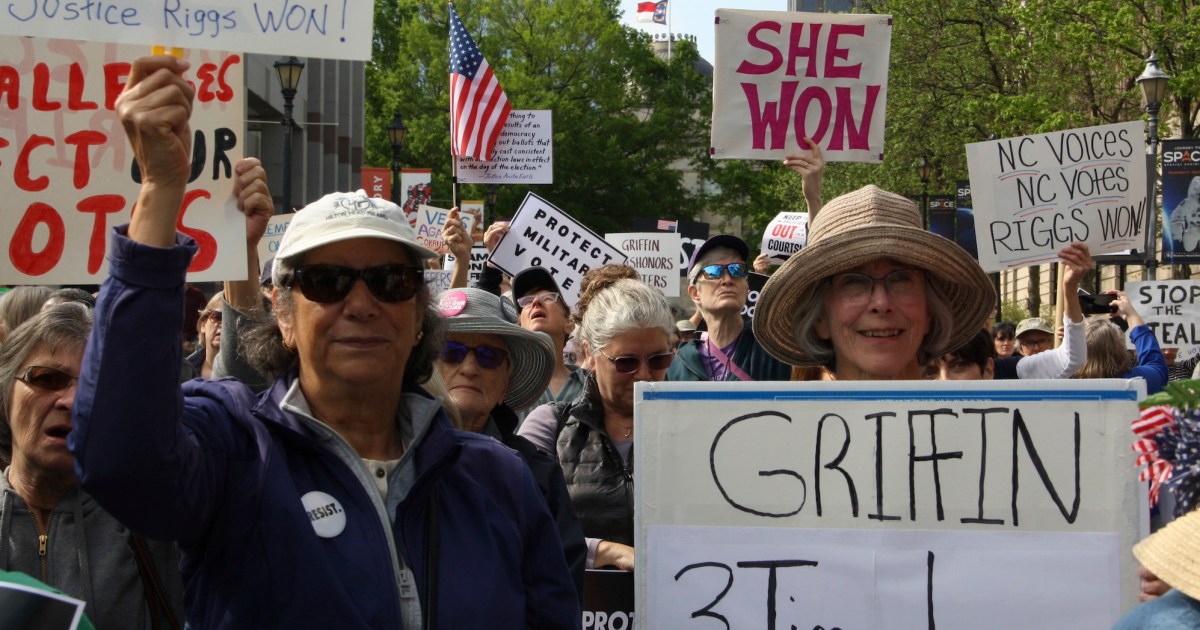The unprecedented GOP attempt to overturn a Democratic victory in a North Carolina State Supreme Court race suffered a major setback Monday night at the hands of a stalwart conservative judge who was appointed by Donald Trump.
In a lengthy ruling, federal district court Judge Richard Myers rejected the effort by Republican candidate Jefferson Griffin to throw out thousands of votes. Myers ordered the state board of election to certify Democrat Allison Riggs’ 734-vote victory.
On April 11, six months after the election, the Republican-dominated state supreme court—still short-handed from the contested election—had green-lit Griffin’s attempt to invalidate enough ballots from overseas and military voters to potentially reverse Riggs’ victory. Democratic Justice Anita Earls called that decision “a bloodless coup.”
“It’s hard to envision a more ‘severe restriction’ than retroactive invalidation of one’s vote.”
On Monday, Myers overruled the state Supreme Court’s decision. “This case concerns whether the federal Constitution permits a state to alter the rules of an election after the fact and apply those changes retroactively to only a select group of voters, and in so doing treat those voters differently than other similarly situated individuals,” he wrote. “This case is also about whether a state may redefine its class of eligible voters but offer no process to those who may have been misclassified as ineligible. To this court, the answer to each of those questions is ‘no.’”
Myers found that the state court decisions agreeing with Griffin’s legal challenges would violate “the equal protection and substantive due process rights of overseas military and civilian voters.” He prominently cited Bush v. Gore, the landmark 2000 case in which the US Supreme Court found that a manual recount ordered by the Florida Supreme Court violated voters’ rights to equal protection under the law because it only applied to three large, Democratic-leaning counties.
“Today, we won,” Riggs said in a statement. “I’m proud to continue upholding the Constitution and the rule of law as North Carolina’s Supreme Court Justice.”
After two recounts had affirmed Riggs’ victory, Griffin initially challenged 60,000 ballots cast by early and mail-in voters who had allegedly submitted incomplete voter registration forms, even though all of them showed ID when they voted. But Griffin didn’t identify a single instance of someone who had voted illegally, and his list including example after example of lawful voters who had been wrongly challenged—including Riggs’ own parents.
The North Carolina Supreme Court rejected that aspect of Griffin’s challenge, but it allowed him to selectively target the ballots of military and overseas voters from heavily Democratic counties who did not show ID when they voted from abroad because it was not required at the time, according to rules codified by the state election board before November. Griffin asked the court to throw out more than 5,000 ballots cast by voters in six Democratic-leaning counties, which he said would result in his victory.
Myers found that this scheme violated those voters’ equal protection and due process rights. “As a consequence, overseas military and civilian voters who cast a ballot in Guilford County are required to undertake additional efforts in order to have their votes counted,” he wrote. “Their neighbors in Randolph, Alamance, and Rockingham Counties need not. That disparate treatment between similarly situated voters, based solely on their casting of ballots in ‘different counties,’ amounts to ‘a constitutional violation’ of the Equal Protection Clause.” He also wrote that “retroactive invalidation of overseas military and civilian voters’ ballots violates their substantive due process rights.”
Griffin additionally challenged close to 300 ballots cast by US citizens living abroad whose parents had established residency in North Carolina. The state Supreme Court ordered those ballots thrown out with no opportunity for the voters to prove their eligibility, even though the law granting voting rights to those so-called “never residents” was unanimously passed by the North Carolina legislature in 2011 and at least 30 people on the list had voted in North Carolina before. “The court finds that post-election ballot disqualification for individuals erroneously designated as Never Residents constitutes a substantial burden on the right to vote,” Myers wrote.
The 68-page opinion—authored by a conservative federal judge—represented an emphatic defeat for Griffin. “It’s hard to envision a more ‘severe restriction’ than retroactive invalidation of one’s vote,” Myers wrote. He called Griffin’s post-election challenge “an attempt to change the rules of the game after it had been played” and added that the “court cannot countenance that strategy.”
Myers gave Griffin a week to appeal the order before the state board certified the result. Election law expert Rick Hasen predicted that further appeals would be rejected, including by the US Supreme Court, given the strength of the due process and equal protection arguments.
Riggs’ victory would maintain the 5-2 Republican majority on the state Supreme Court. But it would give Democrats a shot at retaking the court before the critical 2030 redistricting cycle, when the court could oversee new legislative maps. That’s one reason the race was so hotly contested. “We’ve knocked over the first domino that we need to for Democrats to take back the North Carolina Supreme Court in 2028,” Riggs told me after the election.
But even if Griffin ultimately loses, which now appears likely, his monthslong effort to steal the election sets an extremely dangerous precedent. He got much further than Trump did in 2020, convincing two state courts in North Carolina to throw out thousands of otherwise lawful votes after two recounts had affirmed Riggs’ victory and every other election from November had been certified. That will go a long way toward making election subversion the norm rather than the exception, especially in states where Republicans control state courts.
It shouldn’t be considered a major victory for democracy when an election result is certified six months after the contest has concluded. But that’s where things stand in Trump’s America.















